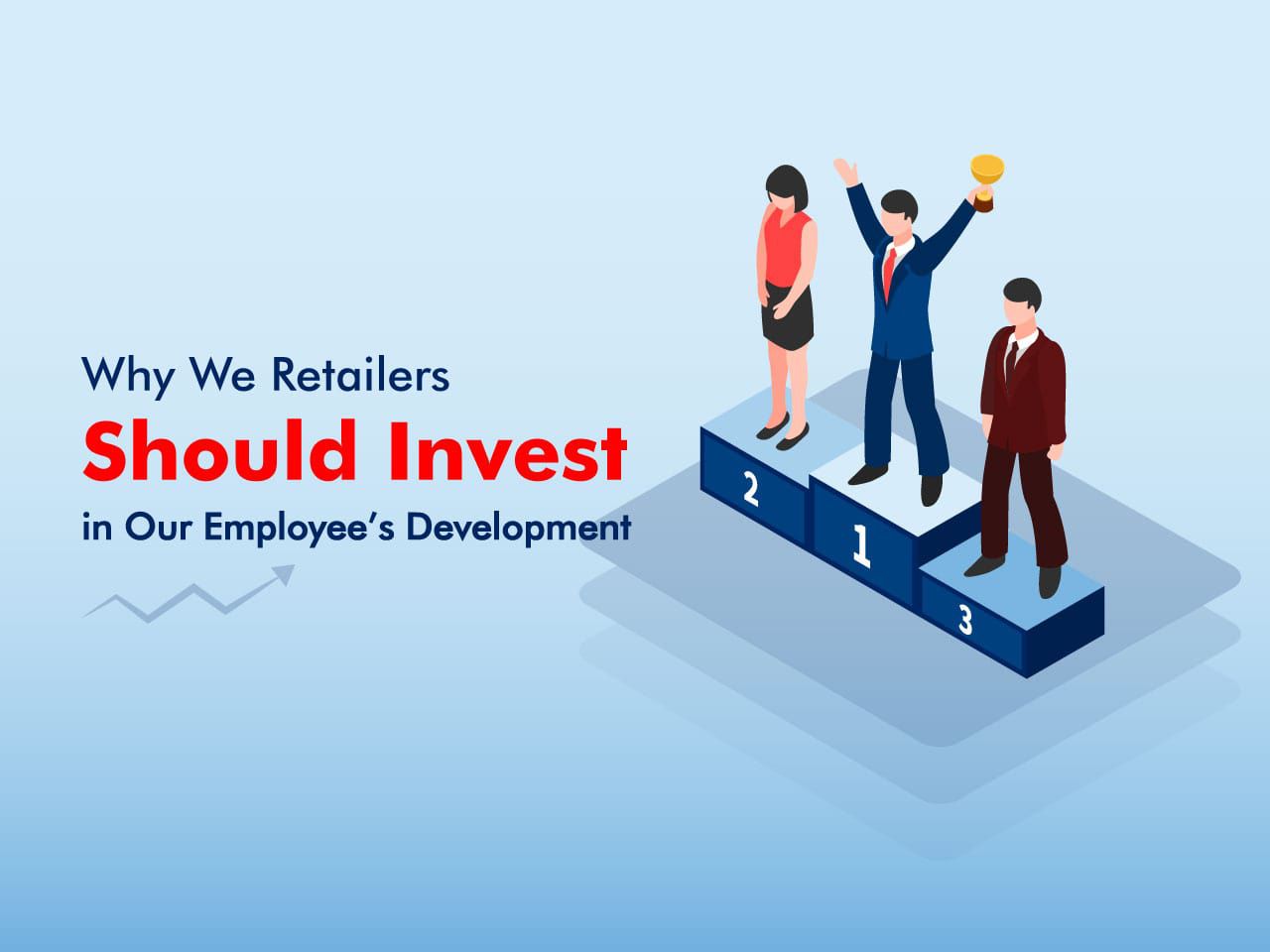Recent Posts

Why We Retailers Should Invest in Our Employee’s Development
Feb 29 / Samantha
Retail is one of the industries with the highest employee turnover rates. Retaining staff remains one of the toughest challenges within our industry. On the other hand, replacing employees requires a lot of energy and costs. So, should you still invest in your employees’ development? “The only thing worse than training your employees and having them leave is not training them and having them stay.” ~ Henry Ford Employees are your company’s most important assets and ultimately, the strength of your organization will be based on the quality of your people, and how well you train, promote and treat them. Hence, their training and professional development is something you should invest heavily in. Here are the 8 core reasons why: Addressing weaknesses A training program allows you to strengthen those skills that each employee needs to improve. This helps reduce any weak links within the company who rely heavily on others to complete basic work tasks. Providing the necessary training creates an overall knowledgeable staff with employees who can take over for one another as needed, work on teams or work independently without constant help and supervision from others. Improved employee effectiveness A report from Hewlett Packard revealed that untrained employees take up to six times longer to perform the same task as a trained employee. The right kind of training can help your employees develop stronger sales skills and greatly increase their productivity. For example, trained staff may be to make the distinction between a customer looking for assistance and one who wants to be left to browse undisturbed. Sometimes this is a hard call to make, but training can help your employees learn to assess what customers really want. Improved employee satisfaction and morale The investment in training that your company makes shows your employees that they are valued. This creates a supportive workplace environment. Employees who feel appreciated and challenged through training opportunities may feel more satisfaction toward their jobs. Reduced employee turnover Staff is more likely to feel valued if they are invested in and therefore, less likely to change employers. Training and development are seen as additional company benefits. You’ll get to lower your recruitment costs due to better talent retention. Ensure consistency A robust training and development program ensures that your employees have a consistent experience and background knowledge. This is particularly relevant for your company’s basic policies and procedures. Increased efficiencies in processes result in a consistent customer experience which would generate financial gain for your company. Happy employees, Happier customers Since your employees are the ones who are actually in contact with your customers, how they think and feel is actually a better representation of your company than all your marketing and advertising material ever could be. Employees who are engaged are more likely to improve customer service which could result in up to 20% increase in sales. As Jim Rohn puts it, “One customer well taken care of could be more valuable than $10000 worth of advertising.” Grow internal leaders Retail training is a perfect way for companies to develop their own leadership and, as a result, retain top talent. Companies need to learn to promote from within, whenever a situation arises. In short, give your top employees a reason to work for you by investing in training techniques that grow leadership skill sets. Enhances company reputation and profile A retail business that invests in its staff will be recognized as being forward-looking. This makes your company more attractive to potential new recruits who seek to improve their skills and the opportunities associated with those new skills. Workers who stay with a retail outlet for many years usually do so because they feel contented with their employer’s dedication to staff development. Providing regular training to your employees not only optimizes their competencies, it increases employee engagement as well. Seeking for a reliable and experienced partner to conduct training programs for your employees? With decades of experience in the retail sector, we at SH Retail Academy can act as a catalyst to help you solve your challenges by improving the level of your employees and making them energetic about the workplace every morning! To know more about our courses, please visit here >> SHRA Programs

Top 10 Leadership Skills in the Workplace
Feb 03 / Samantha
A company is only as good as its people. That’s why we need leaders. A Good leader: Sets the vision and steers the ship Motivates and raises the morale and confidence of employees Makes the tough call and solves critical problems Inspires collective identity and instills culture within the organization Communicates strategic direction clearly and listens to employee feedback Empowers employees to contribute towards achieving the organizations goals Great leaders not only have the ability to communicate well, motivate their team, handle and delegate responsibilities, listen to feedback, and have the flexibility to solve problems in an ever-changing workplace, they create more leaders too! By doing that, they expand their people’s capacity and so the organisation’s capacity to change and to grow. They increase its resilience, agility and capacity to succeed. So, let’s have a look at the TOP TEN(10) leadership skills that can mould you into becoming a strong leader at your workplace: 1. Communication Leaders with good communication skills are able to clearly and succinctly explain everything from organizational goals to specific tasks to their employees, boost their team’s productivity and morale, and subsequently enjoy better relationships with the people around them. 2. Motivation Leaders inspire their employees to go the extra mile to help their organizations reach its goals; They have a clarity of purpose and keep their team engaged and focused. They do this by actively involving, entrusting and empowering their employees while caring and nurturing them to perform at their best. 3. Delegating Leaders who try to take on too many tasks by themselves will struggle to get anything done. A strong leader must know how and who to delegate to, as only by delegating tasks to staff members, can they focus on the tasks that really matter. 4. Positivity A positive attitude can go a long way in an office. If employees feel that they work in a positive environment, they will be more likely to want to be at work, and will therefore be more willing to put in the long hours when needed. 5. Trustworthiness Employees need to be able to feel comfortable coming to their manager or leader with questions and concerns. It is important for leaders to demonstrate their integrity – employees will only trust leaders they respect. By being open and honest, they can encourage the same sort of honesty in their employees. 6. Creativity Most employees are impressed and inspired by a leader who doesn't always choose the safe, conventional path. Therefore, a good leader needs to be able to think outside of the box. Creative leaders have the ability to create and realize innovative solutions especially in the face of structurally complex or changing situations. 7. Feedback One of the most critical areas for leadership success is being able to give honest feedback: praise when it’s deserved and coaching in the moment. By giving constructive feedback, leaders help individuals grow by learning how they can improve and by reinforcing the activities they are doing well. This ultimately helps them achieve both personal and organizational goals. 8. Responsibility Leaders manifest the quality of responsible behaviour through a willingness to take charge and not shirk from decisions, doing things for which there is no immediate reward, but that are in the organization’s best interests. Responsible leaders stay on top of problems by cultivating the mindset that says, “I am the person who must make this happen.” 9. Commitment A leader who is committed shows the conviction and belief that the leader has in the cause. Commitment is a leadership quality that inspires and attracts people. A team will buy into the team leader before they buy into the vision. It is important for leaders to walk the talk and follow through with what they agree to do. 10. Flexibility Good leaders know that although they are committed to their decisions, they have to stay flexible in their approach. Mishaps and last-minute changes always occur at work. Employees will appreciate a leader’s ability to accept changes in stride and find creative solutions. Similarly, leaders must be open to suggestions and feedback. They must always listen to their staff’s concern and be open to making necessary changes. So, there you have it – The 10 essential leadership skills in the workplace. Research has shown that good leaders can make a success of a weak business plan, but a poor leader can destroy even the best plan. That’s why developing effective leadership by having a talent management program at all levels across the organization can return significant business value. Need help with that? With 10 programs just for leadership development, SHRA can help you build a more sustainable future. Get in touch us at www.shretailacademy.com.my to know more!




